Filter by
Found 12368 from your keywords: subject="Political conduct and...
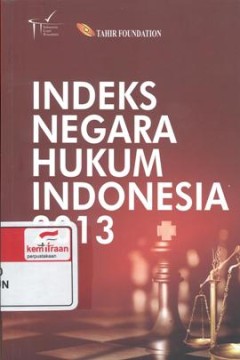
Indeks Negara Hukum Indonesia 2013
- Edition
- 1st print
- ISBN/ISSN
- -
- Collation
- xvi, 116p.; 21 cm
- Series Title
- -
- Call Number
- 340 GUN i
- Edition
- 1st print
- ISBN/ISSN
- -
- Collation
- xvi, 116p.; 21 cm
- Series Title
- -
- Call Number
- 340 GUN i

Indonesia Berdaya: catatan perjalanan magang PNPM Mandiri 2013
- Edition
- -
- ISBN/ISSN
- -
- Collation
- vi, 125p.; 21 cm
- Series Title
- -
- Call Number
- 307.7 PUR i
- Edition
- -
- ISBN/ISSN
- -
- Collation
- vi, 125p.; 21 cm
- Series Title
- -
- Call Number
- 307.7 PUR i
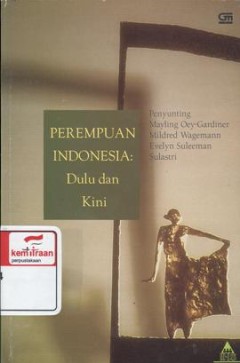
Perempuan Indonesia: dulu dan kini
- Edition
- -
- ISBN/ISSN
- -
- Collation
- xvii, 477p.; 21cm
- Series Title
- -
- Call Number
- 305.4 OEY p
- Edition
- -
- ISBN/ISSN
- -
- Collation
- xvii, 477p.; 21cm
- Series Title
- -
- Call Number
- 305.4 OEY p
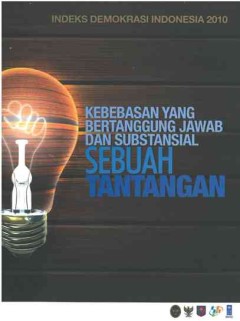
Indeks Demokrasi Indonesia 2010: Kebebasan yang bertanggung jawab dan substan…
- Edition
- -
- ISBN/ISSN
- -
- Collation
- xii, 118p.; 30 cm
- Series Title
- -
- Call Number
- 321.8 GIS i
- Edition
- -
- ISBN/ISSN
- -
- Collation
- xii, 118p.; 30 cm
- Series Title
- -
- Call Number
- 321.8 GIS i

Funding of Political Parties and election Campaigns: a handbook on political …
- Edition
- -
- ISBN/ISSN
- 978-91-87729-24-9
- Collation
- xviii, 436p.; 24 cm
- Series Title
- -
- Call Number
- 324.9 FAL f
- Edition
- -
- ISBN/ISSN
- 978-91-87729-24-9
- Collation
- xviii, 436p.; 24 cm
- Series Title
- -
- Call Number
- 324.9 FAL f
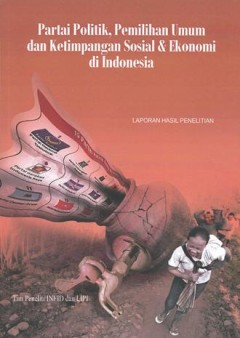
Partai Politik, Pemilihan Umum dan Ketimpangan Sosial dan Ekonomi di Indonesi…
- Edition
- -
- ISBN/ISSN
- 978-602-8384-88-9
- Collation
- xii, 130p.; 24 cm
- Series Title
- -
- Call Number
- 324 INT p
- Edition
- -
- ISBN/ISSN
- 978-602-8384-88-9
- Collation
- xii, 130p.; 24 cm
- Series Title
- -
- Call Number
- 324 INT p
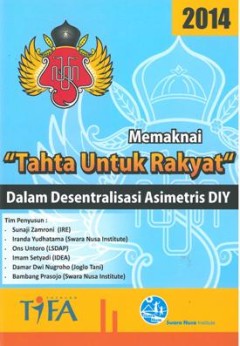
Memaknai Tahta Untuk Rakyat dalam Desentralisasi Asimetris DIY
- Edition
- 1st print
- ISBN/ISSN
- -
- Collation
- xii, 98p.; 20 cm
- Series Title
- -
- Call Number
- 320.959 8 ZAM m
- Edition
- 1st print
- ISBN/ISSN
- -
- Collation
- xii, 98p.; 20 cm
- Series Title
- -
- Call Number
- 320.959 8 ZAM m
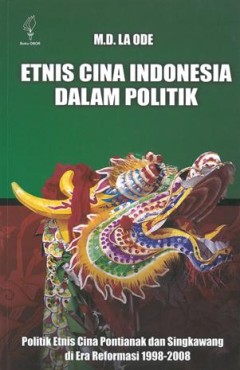
Etnis Cina Indonesia dalam Politik
- Edition
- -
- ISBN/ISSN
- 978-979-461-817-2
- Collation
- xxiv, 406p.; 24 cm
- Series Title
- -
- Call Number
- 305.89 LAO e
- Edition
- -
- ISBN/ISSN
- 978-979-461-817-2
- Collation
- xxiv, 406p.; 24 cm
- Series Title
- -
- Call Number
- 305.89 LAO e
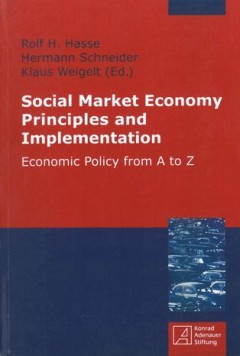
Social market economy principles and implementation: economic policy from A to Z
- Edition
- -
- ISBN/ISSN
- 978-0-9802543-7-2
- Collation
- 532p.; 24 cm
- Series Title
- -
- Call Number
- 338.943 HAS s
- Edition
- -
- ISBN/ISSN
- 978-0-9802543-7-2
- Collation
- 532p.; 24 cm
- Series Title
- -
- Call Number
- 338.943 HAS s

Hutan desa dan pembangunan sosial ekonomi masyarakat desa di kabupaten Bantaeng
- Edition
- -
- ISBN/ISSN
- -
- Collation
- xii, 49p.; 21 cm
- Series Title
- -
- Call Number
- 333.7 SUP h
- Edition
- -
- ISBN/ISSN
- -
- Collation
- xii, 49p.; 21 cm
- Series Title
- -
- Call Number
- 333.7 SUP h
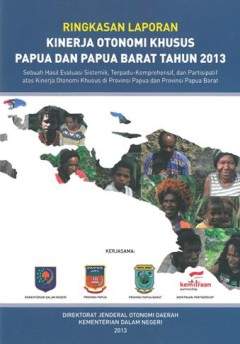
Ringkasan Laporan Kinerja Otonomi Khusus Papua dan Papua Barat tahun 2013: se…
- Edition
- -
- ISBN/ISSN
- 978-602-1616-27-7
- Collation
- 30p.; 25 cm
- Series Title
- -
- Call Number
- 352 JUL r
- Edition
- -
- ISBN/ISSN
- 978-602-1616-27-7
- Collation
- 30p.; 25 cm
- Series Title
- -
- Call Number
- 352 JUL r
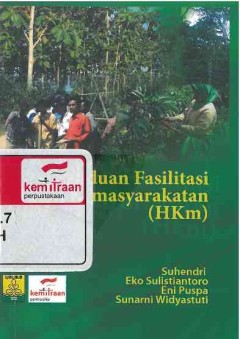
Panduan fasilitasi hutan kemasyarakatan
- Edition
- 1st print
- ISBN/ISSN
- 978-602-1534-18-2
- Collation
- xviii, 138p.; 14 cm
- Series Title
- -
- Call Number
- 333.7 SUH p
- Edition
- 1st print
- ISBN/ISSN
- 978-602-1534-18-2
- Collation
- xviii, 138p.; 14 cm
- Series Title
- -
- Call Number
- 333.7 SUH p

David VS Goliath: pembelajaran kasus-kasus strategis di bidang perburuhan
- Edition
- -
- ISBN/ISSN
- 978-602-14487-3-1
- Collation
- xii, 142p.; 21 cm
- Series Title
- -
- Call Number
- 344 PRA d
- Edition
- -
- ISBN/ISSN
- 978-602-14487-3-1
- Collation
- xii, 142p.; 21 cm
- Series Title
- -
- Call Number
- 344 PRA d

Kumpulan Praktik-Praktik Baik Inovasi Daerah
- Edition
- 1st print
- ISBN/ISSN
- 978-979-95048-5-2
- Collation
- 210p.; 24 cm
- Series Title
- -
- Call Number
- 354.598 YUN k
- Edition
- 1st print
- ISBN/ISSN
- 978-979-95048-5-2
- Collation
- 210p.; 24 cm
- Series Title
- -
- Call Number
- 354.598 YUN k
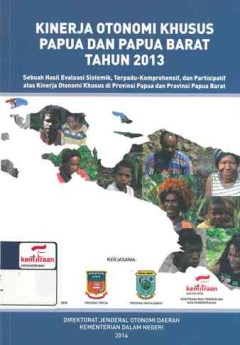
Kinerja Otonomi Khusus Papua dan Papua Barat tahun 2013: sebuah hasil evaluas…
- Edition
- -
- ISBN/ISSN
- 978-602-1616-28-4
- Collation
- xii, 146p.; 25 cm
- Series Title
- -
- Call Number
- 352 JUL k
- Edition
- -
- ISBN/ISSN
- 978-602-1616-28-4
- Collation
- xii, 146p.; 25 cm
- Series Title
- -
- Call Number
- 352 JUL k
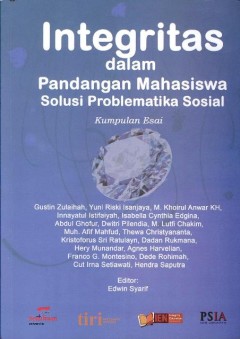
Integritas dalam Pandangan Mahasiswa: Solusi problematika sosial
- Edition
- -
- ISBN/ISSN
- 978-602-17107-0-8
- Collation
- xix, 180p.; 21 cm
- Series Title
- -
- Call Number
- 179.9 SYA i
- Edition
- -
- ISBN/ISSN
- 978-602-17107-0-8
- Collation
- xix, 180p.; 21 cm
- Series Title
- -
- Call Number
- 179.9 SYA i
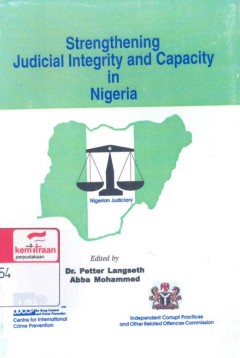
Strengthening judicial integrity and capacity in Nigeria: report of the first…
- Edition
- -
- ISBN/ISSN
- 978-2353-74-4
- Collation
- xxvi, 313p.; 21 cm
- Series Title
- -
- Call Number
- 342.54, LAN, s
- Edition
- -
- ISBN/ISSN
- 978-2353-74-4
- Collation
- xxvi, 313p.; 21 cm
- Series Title
- -
- Call Number
- 342.54, LAN, s
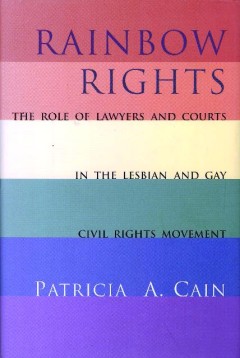
Rainbow Rights : the role of lawyers and courts in the lesbian and gay civil …
- Edition
- -
- ISBN/ISSN
- 0-8133-2618-4
- Collation
- xi, 316p.; 24 cm
- Series Title
- -
- Call Number
- 342.73 CAI r
- Edition
- -
- ISBN/ISSN
- 0-8133-2618-4
- Collation
- xi, 316p.; 24 cm
- Series Title
- -
- Call Number
- 342.73 CAI r
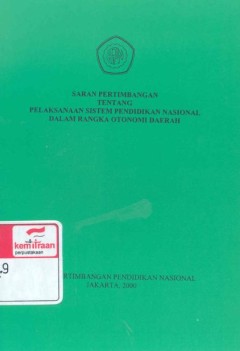
Saran pertimbangan tentang Pelaksanaan sistem pendidikan nasional dalam rangk…
- Edition
- -
- ISBN/ISSN
- 979-9517-05-2
- Collation
- vii, 19p.; 21 cm
- Series Title
- -
- Call Number
- 370.9, IND, p
- Edition
- -
- ISBN/ISSN
- 979-9517-05-2
- Collation
- vii, 19p.; 21 cm
- Series Title
- -
- Call Number
- 370.9, IND, p
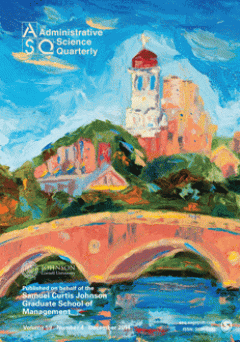
Administrative Science Quarterly, Volume 59, Number 4, December 2014
- Edition
- -
- ISBN/ISSN
- 0001-8392
- Collation
- -
- Series Title
- -
- Call Number
- -
- Edition
- -
- ISBN/ISSN
- 0001-8392
- Collation
- -
- Series Title
- -
- Call Number
- -
 Computer Science, Information & General Works
Computer Science, Information & General Works  Philosophy & Psychology
Philosophy & Psychology  Religion
Religion  Social Sciences
Social Sciences  Language
Language  Pure Science
Pure Science  Applied Sciences
Applied Sciences  Art & Recreation
Art & Recreation  Literature
Literature  History & Geography
History & Geography